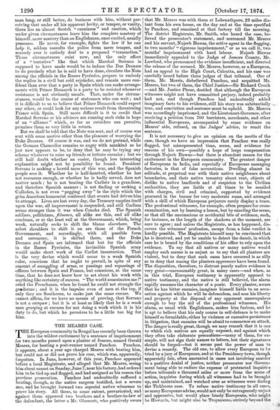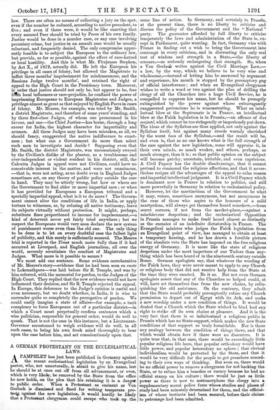THE MEARES CASE.
European community in Bengal has recently been thrown
into the wildest excitement by a sentence of imprisonment for two months passed upon a planter of Jessore, named Gerald Meares, for beating a post-runner named Panchoo. Panchoo, it appears, about a year ago charged Meares with beating him, btit could not or did not prove his case, which was, apparently, forgotten. In June, however, of this year, Panchoo appeared' before a local Magistrate, and alleged that Mr. Meares, seeing him about sunset on Snnday,June 7, near his factory, had ordered him to be tied up and flogged, and had assigned as his reason the previous prosecution. Panchoo had undoubtedly suffered a beating, though, as the native surgeon testified, not a severe one, and he brought forward two especial native witnesses to prove his story. All three, to some extent, prevaricated, and against them appeared two brothers and a brother-in-law of the defendant, the latter a Mr. Glasscott, who positively swore that Mr. Meares was with them at Lokenathpore, 23 miles dis- tant from his own house, on the day and at the time specifed by Panchoo, and remained at that factory till the morning. The district Magistrate, Mr. Smith, who heard the case, be- lieved the prosecutor's statement, -and sentenced Mr. Meares and his servant, Nujeeb Biswas, the active agent in the flogging, to two months"' rigorous imprisonment," or as we call it, two months' imprisonment with hard labour. Nujeeb Biswas immediately appealed to the Judge of Jessore County, Mr. Lawford, who pronounced the evidence insufficient, and directed the release of the accused. Mr. Meares, however, as a European, had an appeal to the High Court, Calcutta, and his case was carefully heard before three judges of that tribunal. One of them, Mr. Morris, disbelieved Panchoo, and acquitted Mr. Meares, but two of them, the Chief Justice—Sir Richard Couch —and Mr. Justice Phear, decided that although the European witnesses might not have committed perjury, indeed probably had not, and though Panchoo had undoubtedly added imaginary facts to his evidence, still his story was substantially--n, true, and conviction and sentence must be upheld. Mr. Meares was accordingly imprisoned, and the Lieutenant-Governor, after receiving a petition from 700 barristers, merchants, and other influential Europeans, accompanied by some evidence on Meares' side, refused, on the Judges' advice, to remit the sentence.
It is not necessary to give an opinion on the merits of the case, though we have an impression that Panchoo was really flogged, but misrepresented time, scene, and evidence for reasons of his own—possibly a hope of large compensation through Nujeeb Biswas—but there is abundant reason for the excitement in the European community. The greatest danger of Europeans in India, and especially of Europeans managing factories, is that of false accusations. Dwelling almost in solitude, at perpetual war with their native neighbours about boundaries, and their native tenantry about rent, objects of dislike to native landlords and of suspicion to the Civilian authorities, they are liable at all times to be assailed with charges, civil and criminal, supported by evidence procured in the bazaar for very moderate sums, and arranged with a skill of which European perjurers rarely display a trace. The professional witnesses, for example, often prepare for cross- examination, not by learning a lesson, but by enacting the scene, so that all the unconscious or accidental bits of evidence, such, for instance, as the length of the shadows at the moment, are sure to agree ; and unless the Magistrate, as has happened, dis- covers the witnesses' profession, escape from a false verdict is hardly possible. The Magistrate himself may be convinced that he is deceived, and yet be unable to detect the deceit, in which case he is bound by the conditions of his office to rely upon the evidence. To say that all natives or many natives would employ such means is as unjust as to say that all planters are violent, but to deny that such cases have occurred is as silly as to deny that among the planters oppressors have been found. The disposition, therefore, to distrust purely native evidence is very great—unreasonably great, in many cases—and when, as in this trial, European testimony is apparently opposed to native testimony, and the native is still believed, the alarm rapidly assumes the character of a panic. Every planter, aware that he has bitter enemies, imagines himself liable to an accu- sation against which he will be defenceless, and sees his liberty and property at the disposal of any opponent unscrupulous enough to buy the aid of the professional witnesses. His alarm, as usual with Englishmen, makes him furious, and he is apt to believe that his only course in self-defence is to make himself so formidable, either by violence or excessive persistence in litigation, that enemies will be afraid to commence an attack. The danger is really great, though we may remark that it is one to which rich natives are equally exposed, and against which they often take elaborate precautions—many of them, for ex- ample, will not sign their names to letters, lest their signatures should be forged—but it seems past the power of man to devise a remedy. The old one, to allow every European to he tried by a jury of Europeans, and at the Presidency town, though apparently fair, often amounted in cases not involving murder to a positive denial of justice, neither prosecutor nor Govern- ment being able to endure the expense of protracted inquiries before tribunals a thousand miles or more from the scene of action, inquiries during which all witnesses had to be brought up, and maintained, and watched over as witnesses were during the Tichborne case. To refuse native testimony in all cases, as many Europeans advise, would not only be outrageously unjust and oppressive, but would place lonely Europeans, who might be Howards, but might also be Tropmanns, entirely beyond the law. There are often no means of collecting a jury on the spot, even if the number be reduced, according to native precedent, to five ; and even if there were, it would be like enacting that every accused Peer should be tried by Peers of his own family. Justice would be done in a murder case, or any case involving pecuniary crime, but justice in an assault case would be usually reluctant, and frequently denied. The only compromise appar- ently feasible is to subject the European to the ordinary law, but provide, as far as possible, against the effect of race-hatred or local hostility. And this is what Mr. Fitzjames Stephen, by Act X., of 1872, actually did. He left the European his privilege in all cases of felony, but allowed the Magistrate to inflict three months' imprisonment for misdemeanour, and the Sessions Judge twelve months', and retained the right of appeal to the High Court in the Presidency town. Moreover, it order that justice should not only be, but appear to be, free API:i local influences or race-prejudice, he confined the power of imprisoning Europeans to European Magistrates and Judges, a privilege almost as great as that enjoyed by English Peers in cases of felony. Mr. Meares, for example, was tried by Mr. Smith, a district Magistrate, and therefore of some years' standing, and by three first-class Judges, of whom one pronounced in his favour, and one—the Chief Justice—has borne, through a long career for India, the highest character for impartiality and acumen. All these Judges may have been mistaken, as all, we should fancy, exaggerated the native indifference to exact- ness ; but what can a Government do more than select such men to investigate and decide ? Supposing even that Mr. Smith, the district Magistrate, was unconsciously swayed by the Civilian's dislike of the planter, as a troublesome and over-independent or violent resident in his district, still, the Calcutta Judges in appeal were not Civilians, could have no conceivable interest in the matter, and were not unanimous, —that is, were not acting, as no doubt even in England Judges sometimes act, on any theory of public policy outside the case in hand. They may be utterly wrong, but how or where are the Government to find abler or more impartial men ; or when it has provided for Europeans a European tribunal and a specially impartial appeal, what is it to do more The Govern- ment cannot alter the conditions of life in India, or apply torture to witnesses, or, by refusing all native testimony, leave its subjects virtually without protection. It might, perhaps, substitute fines proportioned to income for imprisonment,—a kind of deterrent never yet fairly tried anywhere ; but we suspect the Europeans would very soon declare the new system of punishment worse even than the old one. The only thing to be done is to let on every doubtful case the fullest light of publicity, and this surely is sufficiently. secured. The Meares trial is reported in the Times much more fully than if it had occurred at Liverpool, and English journalism, all over the world, severely scrutinises the conduct of Magistrates and Judges. What more is it possible to secure We must add one sentence. Some evidence corroborative of Mr. Meares's story—evidence that he had been seen en route to Lokenathpore--was laid before Sir R. Temple, and was by him referred, with the memorial for pardon, to the Judges of the High Court. They replied that the new evidence would not have influenced their decision, and Sir R. Temple rejected the appeal. In Europe, this deference to the Judge's opinion is useful and even necessary, but we doubt whether, in India, it is wise to surrender quite so completely the prerogative of pardon. We could easily imagine a state of affairs—for example, a tacit conspiracy to force Europeans out of a particular district—in which a Court must perpetually confirm sentences which a wise politician, responsible for general order, would do well to quash. That is not the case in this instance, but a Lieutenant- Governor accustomed to weigh evidence will do well, in all such cases, to bring his own fresh mind thoroughly to bear upon the case before him, and act conscientiously upon that.



































 Previous page
Previous page